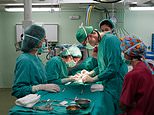Health
Groundbreaking Pig-to-Human Liver Transplant Raises Hope

A significant milestone in organ transplantation was achieved when a pig’s liver was successfully implanted into a human recipient for the first time. This groundbreaking procedure took place in China and represents a pivotal advancement in xenotransplantation, which involves transferring organs from one species to another. The operation occurred on a 71-year-old man suffering from liver cancer and late-stage liver disease, conditions that rendered him ineligible for traditional organ transplant options.
Earlier in 2025, scientists had successfully transplanted a genetically modified pig’s liver into a deceased patient, paving the way for this living transplant. The recipient’s health condition necessitated immediate intervention, as he could not undergo standard treatments such as partial liver removal due to the advanced stage of his disease.
Following the surgery, which took place in early October, the transplanted liver initially demonstrated promising results. For the first month, it functioned effectively without signs of rejection. Unfortunately, complications arose on day 38 post-surgery, leading to the removal of the organ. An immune system reaction caused significant damage to the lining of blood vessels, prompting medical intervention that included medications and a procedure aimed at filtering harmful substances from the patient’s blood.
Despite these efforts, the patient experienced gastrointestinal haemorrhage episodes, which ultimately led to his death on day 171 after the transplant. This tragic outcome highlights the complexities and challenges associated with xenotransplantation, especially concerning immune rejection and organ compatibility.
The advancement in organ transplantation techniques holds promise for thousands of individuals awaiting life-saving procedures. With rising numbers of patients on organ waiting lists globally, research into the use of genetically modified animal organs may provide a viable alternative in the future. As the medical community continues to explore these avenues, the recent surgery marks a crucial step in the ongoing quest to address organ shortages and improve transplant outcomes.
As further studies and developments unfold, the implications of this surgical innovation will likely reverberate throughout the field of transplant medicine, offering hope to those in desperate need of organ replacements.
-

 Health1 month ago
Health1 month agoFiona Phillips’ Husband Shares Heartfelt Update on Her Alzheimer’s Journey
-

 Health1 month ago
Health1 month agoNeurologist Warns Excessive Use of Supplements Can Harm Brain
-

 World1 month ago
World1 month agoCole Palmer’s Cryptic Message to Kobbie Mainoo Following Loan Talks
-

 Entertainment3 months ago
Entertainment3 months agoLove Island Star Toni Laite’s Mother Expresses Disappointment Over Coupling Decision
-

 Entertainment2 months ago
Entertainment2 months agoMajor Cast Changes at Coronation Street: Exits and Returns in 2025
-

 Entertainment2 months ago
Entertainment2 months agoMasterChef Faces Turmoil as Tom Kerridge Withdraws from Hosting Deal
-

 World2 weeks ago
World2 weeks agoMassive Sinkhole Opens in Bangkok, Swallowing Cars and Causing Chaos
-

 World3 weeks ago
World3 weeks agoMichelle Tsiakkas Opens Up About Jamie Borthwick Before BBC Exit
-

 Lifestyle2 months ago
Lifestyle2 months agoEngland Flags Spark Controversy This Summer: A Cultural Debate
-

 Entertainment3 months ago
Entertainment3 months agoWoman Transforms Life with Boot Camp, Losing Nearly 9 Pounds in a Week
-

 World1 month ago
World1 month agoCoronation Street’s Asha Alahan Faces Heartbreaking Assault
-

 Entertainment3 months ago
Entertainment3 months agoColeen Nolan Reflects on Family Tragedy and Reconciliation









